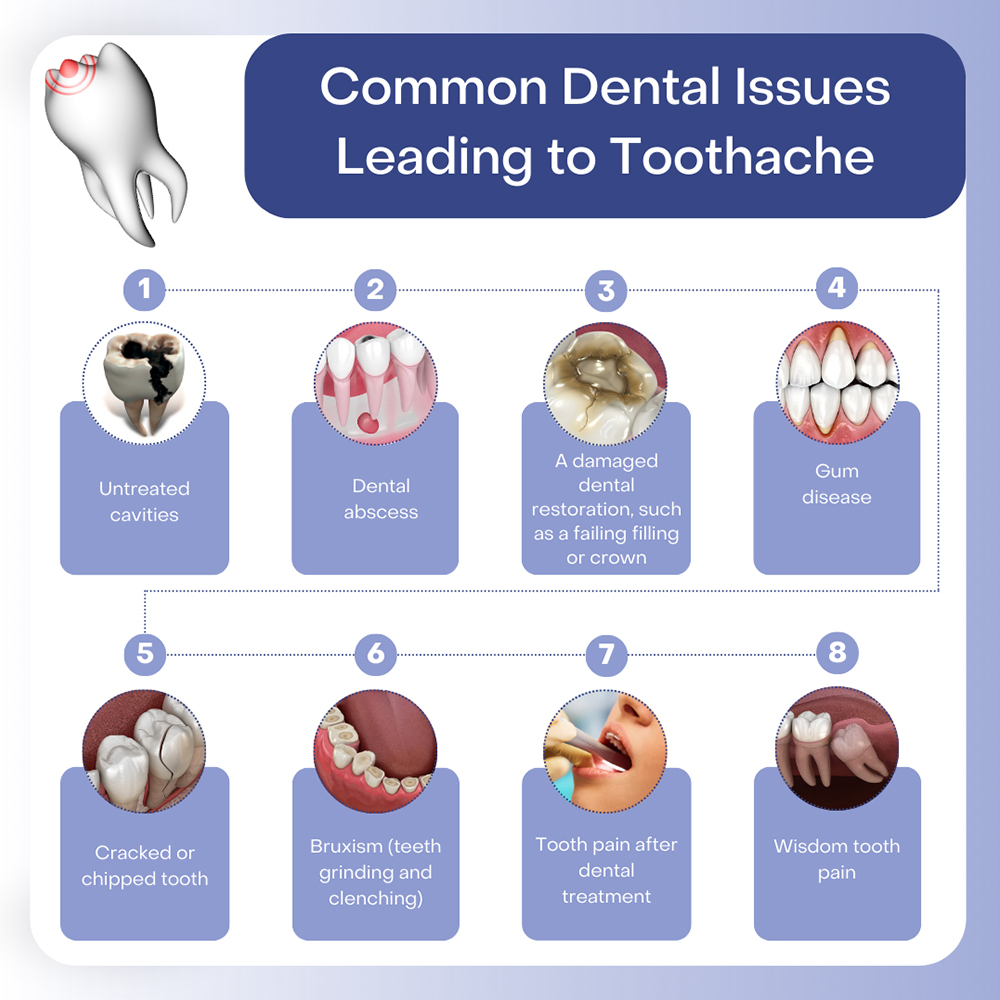What Are the Different Types of Toothache?
Tooth pain ranges in severity from mild and annoying to throbbing and all-consuming. Tooth pain makes eating, drinking and speaking more challenging. Untreated, tooth pain can become excruciating. It can lead to other health problems, like headaches, neck stiffness and jaw pain.
Tooth pain usually is the result of inflammation, which is your body’s way of fending off injury and disease. But inflammation causes pressure on the tissue and nerves in your mouth. When you visit Dr. Victoria Kushensky, an Bronx, NY, dentist at Bronx Dental Spa, for tooth pain relief, the first step is to find the reason for the inflammation and the source of your pain.
Reasons for Throbbing Tooth Pain
Various dental problems can result in a toothache and include:
- Untreated cavities.
- Dental abscess.
- A damaged dental restoration, such as a failing filling or crown.
- Gum disease.
- Cracked or chipped tooth.
- Bruxism (teeth grinding and clenching).
- Tooth pain after dental treatment.
- Wisdom tooth pain.

Several conditions cause tooth pain, which can lead you to seek tooth pain relief. The position of the pain in your mouth sometimes gives clues as to the cause. Dr. Victoria Kushensky, your Bronx, NY dentist, uses these clues to make a diagnosis. Some of the conditions contributing to tooth pain include:
- Cavities. The most common cause of toothaches occurs when a hole in the tooth enamel develops, allowing decay-causing bacteria to set in. When the decay reaches the nerve root, changes in temperature, increased blood flow and saliva cause tooth sensitivity and pain.
- An abscessed tooth. As decay and bacteria work deeper into the tooth, an infection may develop. As your body fights the infection, swelling, discomfort and pain result. Other symptoms of an abscessed tooth include headaches, earaches, fever and swelling in your mouth, face or jaw.
- Gum disease. Gingivitis and periodontitis expose the root of your tooth to changes in temperature and to bacteria.
- Root sensitivity. Whether due to gum disease or cavities, anything that exposes the root of a tooth means it has less protection, increasing its sensitivity. You end up avoiding foods that are hot, cold, sweet or acidic. Certain toothpastes desensitize your teeth to ease your discomfort, but the only way to truly care for this situation requires addressing the underlying problems.
- Bruxism. Grinding your teeth, a condition called bruxism, causes cracks in the enamel of your teeth. These cracks, along with the wear-and-tear on your jaw muscles, lead to pain. If you have sleep apnea, you may be prone to grinding your teeth in your sleep.
- Trauma. When you get hit in the mouth, you may end up with a crack, chip or break that exposes a tooth nerve and causes extreme tooth pain. Front tooth pain can be especially difficult to bear because of the air that passes through your front teeth, making even breathing a source of discomfort.
- Impacted wisdom teeth. You feel wisdom tooth pain in your back molars when your wisdom teeth erupt, usually during early adulthood. When there isn’t enough space for these big back teeth, throbbing tooth pain ensues.
- Deteriorating or faulty dental work. If a filling or crown comes loose, you’ll feel pain until it’s repaired. That’s a dental emergency. But you may feel tooth pain after a filling or just minor sensitivity after a filling, especially if all the decay wasn’t removed.
To get the best care for tooth pain, rely on the experience and training of a renowned dentist like Dr. Victoria Kushensky and his team at Bronx Dental Spa in Bronx, NY. You can avoid tooth pain from improper dental work when you visit the best family dentist in Bronx, NY.
Tooth Pain Relief
Your tooth pain may start small and increase in intensity, or it may appear suddenly. Symptoms include throbbing pain, discomfort when eating certain foods, headaches, sensitivity to touch, even swelling and bleeding gums at the tooth site.
Treatment depends on the underlying cause. After a thorough examination and medical history, Dr. Kushensky discusses your options for treatment, which include:
- Treating the cavities discovered. Your family dentist removes the decay and bacteria, then fills the hole with composite resin to renew the protection for your tooth nerve and root.
- A root canal procedure if your tooth root is compromised. Dr. Kushensky removes the nerve of your tooth, so you can’t feel pain in that tooth ever again. The space is then covered with a crown to protect and support the remaining tooth structure.
- A tooth extraction. Dr. Kushensky may have to pull the tooth if it’s severely compromised or if your wisdom teeth have nowhere to grow.
- A deep cleaning. This process removes bacteria along and under your gum line, where it’s become irritated. Tooth sensitivity due to gum disease lessens after a deep cleaning and root scaling.
- When necessary, your family dentist prescribes antibiotics to treat tooth infections before performing any further dental procedures.
When you maintain regular visits to your Bronx, NY dentist for professional cleanings and checkups, you reduce the risk of developing tooth pain. But when it does hit, the team at Bronx Dental Spa provides you with tooth pain relief when you need it. Contact Dr. Victoria Kushensky today for fast, effective treatment.
